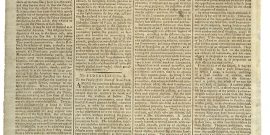Impeachment was designed with the idea in mind that presidents sometimes might warrant removal from office, and this might flow from many causes.
In which I review a book I won't read
So there’s yet another biography of Madison out, and this one is by Lynne Cheney. I might have bought it for the author, not the book’s subject, as it’s hard to see this sort of thing as much more than a display of patriotism. The French have Rousseau, the Germans Kant, the British (or Scots) Hume. The Americans have Madison, and must make the most of him, even if he is not much read outside of their country.
One of the Philadelphia Convention’s turning points came on July 17, when Gouverneur Morris argued for an elected president on a theory of separation of powers. He was joined by Madison two days later, but Morris was there first. I suspect he persuaded Madison to drop the Virginia Plan and the idea of a Congressionally-appointed president because this would have strengthened the states, after the adoption of the Connecticut compromise with equal representation of the states in the senate. Everyone would have expected, moreover, that state legislators would mostly do the appointing of senators. Madison was a nationalist, like Morris, and what Morris had done was to unite the nationalists around the idea of an elected president. That’s not what the Framers thought they had agreed to, in the end, but as that’s how it turned out it’s Morris we have to blame.
What Madison had wanted was rep by pop in the House, an appointed Senate and a chief executive appointed by the legislature. He also wanted a “national veto” over state laws, and each one of these may be found in Canada’s constitution, the 1867 British North America Act. It’s all very well to call Madison the “father of the Constitution,” but do be careful about the constitution to which you refer.

